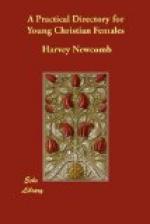III. Another object of self-examination is, to ascertain the cause of afflictions, whether spiritual or temporal. If the Lord sends distress upon us, or hides from us the light of his countenance, he has some good reason for it. By reading the book of Haggai, you will discover the principles upon which God deals with his people. If, therefore, the work of your hands does not prosper, or, if the Lord has withdrawn from you his special presence, be sure that something is wrong; it is time for you to “consider your ways.” In this book the Lord informs the Jews of the cause of their poverty and distress. They had not built the house of God. He also tells them that the silver and the gold are his; and that he will bless them as soon as they do their duty. We are as dependent upon God’s blessing now as his people were then. If we withhold from him what he requires of us for advancing the interests of his kingdom, can we expect temporal prosperity? If we refuse to do our duty, can we expect his presence? These, then, should be the subjects of inquiry, under such circumstances. In such cases, also, it may be very proper to observe a day of fasting and prayer.
IV. Another object of self-examination is, to know whether we are Christians. “Examine yourselves whether ye be in the faith.” This is a very important inquiry. It is intimately connected with every other, and should enter more or less into all. In order to prosecute this inquiry, you must make yourself thoroughly acquainted with the evidences of Christian character. These are clearly exhibited in the holy Scriptures. Study the Bible diligently for this purpose; and, wherever you discover a mark of Christian character, inquire whether you possess it. You may also find benefit from the writings of men of great personal experience, who have had much opportunity of observing the effects of true and false religion. In particular, I would recommend to you the careful study of President Edwards’ Treatise on Religious Affections. He was a man of great piety, who had attained to the full assurance of hope. He had also passed through a number of revivals of religion. The work of which I speak contains a scriptural view of the evidences of the new birth; and also points out, with great clearness and discrimination, the marks of false religion. He distinguishes between those things which may be common both to true and false religion, and those which are the certain marks of true conversion.
Self-examination, for this object, should be habitual. In reading the Bible, in meditation, in hearing the word, wherever you see an evidence of Christian character, inquire whether you possess it. But this is not sufficient. You ought frequently to set apart seasons for the solemn and prayerful consideration of the important question,—“Am I a Christian?” A portion of the Sabbath may be very properly spent in this way. You should enter upon this work with the solemnities of the judgment-day




